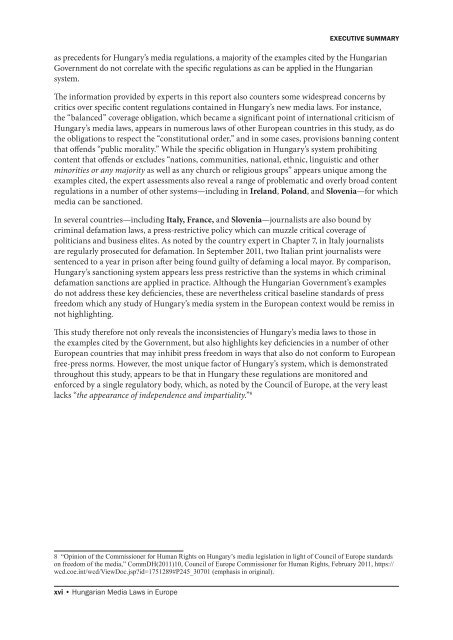An Assessment of the Consistency of Hungary's Media Laws with ...
An Assessment of the Consistency of Hungary's Media Laws with ...
An Assessment of the Consistency of Hungary's Media Laws with ...
Create successful ePaper yourself
Turn your PDF publications into a flip-book with our unique Google optimized e-Paper software.
xvi • Hungarian <strong>Media</strong> <strong>Laws</strong> in Europe<br />
executive summary<br />
as precedents for Hungary’s media regulations, a majority <strong>of</strong> <strong>the</strong> examples cited by <strong>the</strong> Hungarian<br />
government do not correlate <strong>with</strong> <strong>the</strong> specific regulations as can be applied in <strong>the</strong> Hungarian<br />
system.<br />
The information provided by experts in this report also counters some widespread concerns by<br />
critics over specific content regulations contained in Hungary’s new media laws. For instance,<br />
<strong>the</strong> “balanced” coverage obligation, which became a significant point <strong>of</strong> international criticism <strong>of</strong><br />
Hungary’s media laws, appears in numerous laws <strong>of</strong> o<strong>the</strong>r European countries in this study, as do<br />
<strong>the</strong> obligations to respect <strong>the</strong> “constitutional order,” and in some cases, provisions banning content<br />
that <strong>of</strong>fends “public morality.” while <strong>the</strong> specific obligation in Hungary’s system prohibiting<br />
content that <strong>of</strong>fends or excludes “nations, communities, national, ethnic, linguistic and o<strong>the</strong>r<br />
minorities or any majority as well as any church or religious groups” appears unique among <strong>the</strong><br />
examples cited, <strong>the</strong> expert assessments also reveal a range <strong>of</strong> problematic and overly broad content<br />
regulations in a number <strong>of</strong> o<strong>the</strong>r systems—including in Ireland, Poland, and Slovenia—for which<br />
media can be sanctioned.<br />
in several countries—including Italy, France, and Slovenia—journalists are also bound by<br />
criminal defamation laws, a press-restrictive policy which can muzzle critical coverage <strong>of</strong><br />
politicians and business elites. As noted by <strong>the</strong> country expert in Chapter 7, in italy journalists<br />
are regularly prosecuted for defamation. in September 2011, two italian print journalists were<br />
sentenced to a year in prison after being found guilty <strong>of</strong> defaming a local mayor. By comparison,<br />
Hungary’s sanctioning system appears less press restrictive than <strong>the</strong> systems in which criminal<br />
defamation sanctions are applied in practice. Although <strong>the</strong> Hungarian government’s examples<br />
do not address <strong>the</strong>se key deficiencies, <strong>the</strong>se are never<strong>the</strong>less critical baseline standards <strong>of</strong> press<br />
freedom which any study <strong>of</strong> Hungary’s media system in <strong>the</strong> European context would be remiss in<br />
not highlighting.<br />
This study <strong>the</strong>refore not only reveals <strong>the</strong> inconsistencies <strong>of</strong> Hungary’s media laws to those in<br />
<strong>the</strong> examples cited by <strong>the</strong> government, but also highlights key deficiencies in a number <strong>of</strong> o<strong>the</strong>r<br />
European countries that may inhibit press freedom in ways that also do not conform to European<br />
free-press norms. However, <strong>the</strong> most unique factor <strong>of</strong> Hungary’s system, which is demonstrated<br />
throughout this study, appears to be that in Hungary <strong>the</strong>se regulations are monitored and<br />
enforced by a single regulatory body, which, as noted by <strong>the</strong> Council <strong>of</strong> Europe, at <strong>the</strong> very least<br />
lacks “<strong>the</strong> appearance <strong>of</strong> independence and impartiality.” 8<br />
8 “Opinion <strong>of</strong> <strong>the</strong> Commissioner for Human Rights on Hungary’s media legislation in light <strong>of</strong> Council <strong>of</strong> Europe standards<br />
on freedom <strong>of</strong> <strong>the</strong> media,” CommDH(2011)10, Council <strong>of</strong> Europe Commissioner for Human Rights, February 2011, https://<br />
wcd.coe.int/wcd/ViewDoc.jsp?id=1751289#P245_30701 (emphasis in original).

















